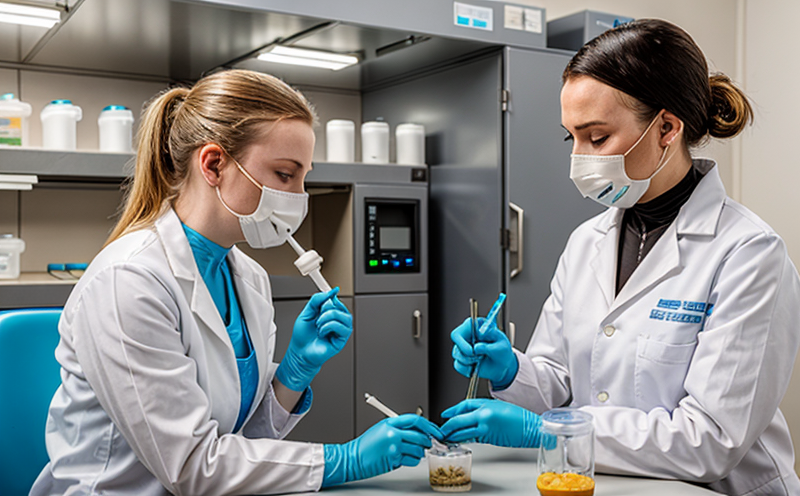EN 22058 Fumonisin Residue Testing in Corn Flour
The European Standard EN 22058 specifies methods for determining fumonisin residues, particularly Fumonisins B1 and B2, in corn flour. This service is essential for ensuring food safety and compliance with international regulations aimed at protecting public health from mycotoxin contamination.
The standard applies to corn flour intended for human consumption or use as an ingredient in the production of foods where the presence of fumonisins could pose a risk to consumers. Fumonisins are potent toxins produced by certain strains of Fusarium fungi and can lead to serious health issues, including liver damage, cancer, and even death.
The testing process involves several critical steps: sample collection, preparation, extraction, and analysis using liquid chromatography-tandem mass spectrometry (LC-MS/MS). This method provides high sensitivity and specificity for detecting fumonisins at trace levels. Compliance with this standard ensures that corn flour meets the strictest international safety standards.
Our laboratory utilizes state-of-the-art instrumentation, including advanced LC-MS/MS equipment, to ensure accurate and reliable results. Each sample undergoes rigorous quality control measures to minimize errors and provide consistent data. This service is invaluable for food processors, manufacturers, and retailers who need to verify the safety of their products.
The testing procedure begins with proper sampling techniques to ensure that representative samples are collected from various locations within the batch or lot. Samples are then prepared according to standardized protocols before undergoing extraction using a suitable solvent system. The extracted compounds are purified and concentrated prior to final analysis by LC-MS/MS.
Results are reported in parts per billion (ppb), which is the standard unit for quantifying fumonisin residues. Compliance with EN 22058 ensures that corn flour meets EU directives on maximum allowable limits of fumonisins, currently set at 1 ppb for Fumonisin B1 and B2 combined.
Understanding the significance of this testing is crucial for food safety professionals who must ensure their products meet regulatory requirements. By adhering to EN 22058, our laboratory provides assurance that corn flour used in food production complies with stringent European standards.
Applied Standards
| Standard Reference | Description |
|---|---|
| EN 22058-1 | Method for the determination of fumonisins B1 and B2 in corn flour by liquid chromatography-tandem mass spectrometry (LC-MS/MS) |
| ISO 6523:2019 | Guide to Good Laboratory Practice (GLP) |
| ASTM E2487-17 | Standard practice for laboratory quality control procedures for quantitative chemical analysis by liquid chromatography/mass spectrometry (LC/MS and LC/MS/MS) |
Quality and Reliability Assurance
Our commitment to quality and reliability is reflected in our adherence to international standards, including those outlined in EN 22058. We maintain a rigorous quality management system that ensures every aspect of the testing process adheres strictly to these guidelines.
We employ highly skilled analysts who are trained specifically for this type of analysis using the latest methodologies and technologies. Our laboratory is accredited according to ISO/IEC 17025:2017, which sets global standards for the competence of testing and calibration laboratories.
To further enhance reliability, our laboratory participates in proficiency testing programs organized by recognized bodies such as the European Co-operation for Accreditation (EA) and the International Laboratory Accreditation Cooperation (ILAC). These programs provide independent validation of our analytical capabilities and ensure consistency across tests conducted over time.
Environmental and Sustainability Contributions
- Promotes safe consumption by detecting harmful mycotoxins in corn flour.
- Aids in reducing food waste through accurate testing that ensures only safe products reach consumers.
- Facilitates sustainable agricultural practices by providing data necessary for improving crop quality and minimizing contamination risks.
- Contributes to public health by ensuring compliance with strict international regulations designed to protect human health from mycotoxin exposure.





